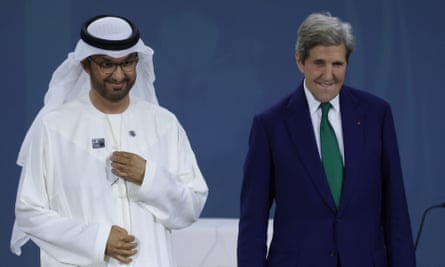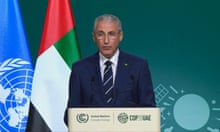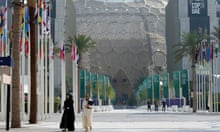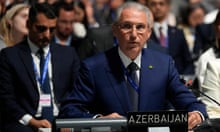Mary Robinson, the former president of Ireland, has called for a rapid phase-out of fossil fuels, in a diplomatic but firm response to the row over comments made to her by the Cop28 president, which were revealed by the Guardian this week.
In a live online event, Sultan Al Jaber had told Robinson there was “no science out there, or no scenario out there, that says that the phase-out of fossil fuel is what’s going to achieve 1.5C”, a view strongly rejected by many scientists. As well as running the Cop28 UN climate summit in Dubai, Al Jaber is the chief executive of the United Arab Emirates’ state oil company, Adnoc.
Robinson posted on X: “A successful Cop28 is not about a single individual or nation but the collective will and concerted efforts of all countries in these negotiations. The science compels: phase out fossil fuels rapidly, accelerate renewable energy adoption, and radically scaled up finance.”
She did not mention Al Jaber by name. Robinson is the chair of the Elders, a group of former world leaders set up by Nelson Mandela.
Al Jaber defended his respect for climate science on Monday. “I respect the science in everything I do. I have repeatedly said that it is the science that has guided the principles or strategy as Cop28 president,” he said.
Others were more openly critical. The former US vice-president Al Gore told the New York Times: “From the moment this absurd masquerade began, it was only a matter of time before [Al Jaber’s] preposterous disguise no longer concealed the reality of the most brazen conflict of interest in the history of climate negotiations. Obviously, the world needs to phase out fossil fuels as quickly as possible.”
Simon Evans, a senior policy editor at Carbon Brief, noted on X that Russia’s war in Ukraine meant Al Jaber could also be in charge next year.
It is the turn of eastern Europe to host the next Cop but Russia is vetoing the 27 EU countries, and Armenia and Azerbaijan are vetoing each other. That leaves only seven, mostly small states, and organising a Cop is very expensive.
Evans said the UN rules of procedure were clear: Bonn, in Germany, and the sites of the UN climate secretariat was the default location and, if no new president was elected, Al Jaber would preside at Cop29.
The latest draft of the negotiating text on the global stocktake, published on Tuesday after 24 hours of discussions, according to negotiators, revealed there had been some progress but the big decisions were yet to be taken.

On the crucial issue of the phase-out of fossil fuels, language that would commit countries to a phase-out had been retained in the text but the option of that being deleted was not ruled out.
after newsletter promotion
Attitudes are reportedly constructive, though observers noted that Saudi Arabia is attempting to introduce references to carbon capture and storage at every opportunity – and even where there should not be an opportunity. The kingdom is also trying to add the word “emissions” after fossil fuels in any reference to their phase-out or phase-down.
China’s position was puzzling Cop-watchers in some respects – the country had not signed up to the pledge to triple renewable energy despite having one of the strongest renewable energy industries in the world, and being a big supplier of renewable energy components and equipment that stands to benefit hugely from this commitment.
Some experts believe it may be connected to China’s perennial reluctance to sign up to anything it did not initiate, or linked to internal wrangling over the future of coal.
The Guardian was also told by more than one country that China’s negotiators, who are aligned with the China and G77 negotiating group, have taken so long to speak in their allotted slots that other developing countries had been unable to get a look in.
They say there are potential differences of opinion within the G77, as smaller developing countries have bigger concerns about 1.5C while China has a history at these talks of preferring to talk about “the Paris goals” – the plural is a pointed reference to the higher temperature goal in the treaty, of holding temperature rises to “well below” 2C.
Al Jaber told the Guardian he was hoping for “the most ambitious global stocktake”.










